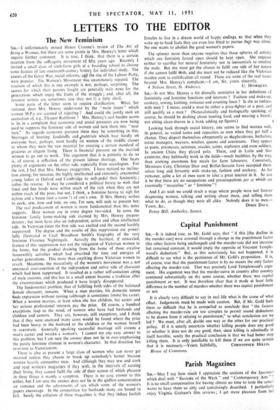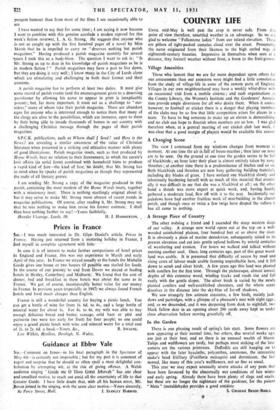Parish Magazines
SIR,—May I say how much I appreciate the sections of the Spectator which deal with "Reviews of the Week" and "Contemporary Arts"? It is no small compensation for having almost no time to taste the actual wares to have them so ably and tantalisingly described. 1 particularly enjoy Virginia Graham's film reviews; I get more pleasure from her
pungent humour than from most of the films I am occasionally able to see.
I have wanted to say that ior some time ; I am saying it now because I want to combine with this genuine accolade a modest reproof for this week's fiction reviewer, L. A. G. Strong. He suggests that anyone who Is not so caught up with the first hundred pages of a novel by Miss Marsh that he is impelled to carry on " deserves nothing but parish magazines." Having produced a parish magazine monthly for several years I took this as a body-blow. The question I want to ask is: "Is Mr. Strong as up to date in his knowledge of parish magazines as he is in modern fiction ? " Parish magazines may have a past to live down, but they are doing it very well ; I know many in the City of Leeds alone which are stimulating and challenging in both their format and their contents.
A parish magazine has to perform at least two duties. It must give some record of parish events (and the encouragement given to a deserving parishioner by allowing his name to appear in print is inexplicably potent); but, far more important, it must act as a challenge to "out- siders," many of whom take their parish magazine. There are abundant signs for anyone who is interested enough to notice them that many of the clergy are alive to the possibilities, which are immense, open to them by their being able to invade thousands of homes in our country with a challenging Christian message through the pages of their parish magazines.
S.P.C.K. publications, such as Whom shall 1 Send? and Here is the News! are revealing a similar awareness of -the value of Christian literature when presented in a striking and attractive manner with plenty of good illustrations. Parish magazine insets, such as that produced by Home Words, bear no relation to their forerunners, in which the curate's love affairs (in serial form) combined with household hints to produce a vapid kind of fare—the kind of fare, Ito doubt, that Mr. Strong has in mind when he peaks of parish magazines as though they represented the nadir of all literary genres.
I am sending Mr. Strong a copy of the magazine produced in this parish, containing the most modem of the Home Words insets, together with a missionary inset. There is nothing startlingly original about it, but it may serve to make Mr. Strong more abreast of recent ,trends in magazine publications. Of course, after reading it, Mr. Strong may say that he sees nothing to make him revise his former estimate. I shall then have nothing further to say!—Yours faithfully,



































 Previous page
Previous page